 MyCatBreeds
MyCatBreeds Both Tortoiseshell and American Keuda are originated from United States. Both Tortoiseshell and American Keuda are having almost same weight. Tortoiseshell may live 5 years more than American Keuda. Both Tortoiseshell and American Keuda has same litter size. Tortoiseshell requires Moderate maintenance. But American Keuda requires Low maintenance
Both Tortoiseshell and American Keuda are originated from United States. Both Tortoiseshell and American Keuda are having almost same weight. Tortoiseshell may live 5 years more than American Keuda. Both Tortoiseshell and American Keuda has same litter size. Tortoiseshell requires Moderate maintenance. But American Keuda requires Low maintenance
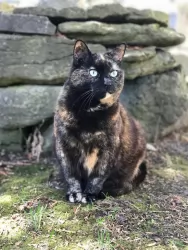 The Tortoiseshell isn’t a cat breed but rather a coat coloring of cats. It just happens that most tortoiseshell cats are females.
The Tortoiseshell isn’t a cat breed but rather a coat coloring of cats. It just happens that most tortoiseshell cats are females.
Known as Torties, these cats always have a couple of colors such as red and black as well as some fawn.
Tortoiseshell cats with the tabby pattern are referred to as Torbie cats. Tortoiseshell markings appear in many different breeds.
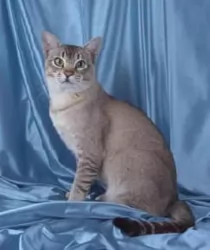 It is thought that the cat was brought to America by the Spanish to keep the rat population down.
It is thought that the cat was brought to America by the Spanish to keep the rat population down.
The name KEUDA stands for Kitten Evaluation Under Direct Assessment which is actually the name of a program that was running in Texas, Oklahoma and New Mexico and was for investigating the kinds of cats that survived as barn cats.
Today the Keuda isn’t registered and it’s not a well-known cat either, being looked upon as being similar to the Egyptian Mau breed as it shares some physical similarities with the Mau.
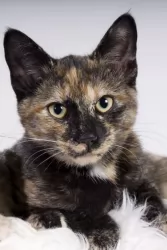 Tortoiseshell cats are your regular-sized cats. They can be medium-sized to large and weigh anything between 3 and 7kg.
Tortoiseshell cats are your regular-sized cats. They can be medium-sized to large and weigh anything between 3 and 7kg.
They come in different colors and patterns. The colors are essentially cream, fawn, black, tan, and orange. Tortoiseshell markings appear in all the different cat breeds.
Because the tortoiseshell cat is a color and not a cat breed as such they can be different sizes and shapes.
Tortoiseshell cats aren't a specific breed, but there are people that believe that just the color of the coat is indicative of the personality – feisty and lively.
People who have owned these cats say they have a sassy temperament and can even be just a wee bit aggressive sometimes with their strong-willed attitude.
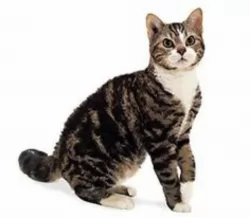 You can’t really pin-point what the American Keuda looks like as it looks a lot like the Maus but it can also look like a Siamese cat or even others.
You can’t really pin-point what the American Keuda looks like as it looks a lot like the Maus but it can also look like a Siamese cat or even others.
It is a medium-sized cat and can weigh up to 5 or 6kg while being very lithe and athletic. The head of the cat is medium-sized, the ears medium-large, the eyes almond-shaped, and the tail is slightly tapered.
An unusual aspect with this cat is its belly flap – loose skin that flaps at each elbow. The head is wedge-shaped, it has almond-shaped eyes, large ears and the fur is soft and silky and in a variety of patterns as well as solid colors. The coat is short to medium in length and there is no undercoat.
American Keudas are just your regular cat in personality - active, adaptable, inquisitive, and intelligent while being strong and agile.
They are also adaptable and social, getting along well with children as well as other pets in the home. It is also quite unusual in that it likes playing with water. They are also playful and love running, jumping and climbing and indoors it will want a climbing cat tree.
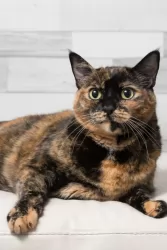 Your Tortoiseshell is a beautiful cat and fondly referred to as a Tortie. It has a coat similar to the coloring of a tortoise, but the temperament of the cat will rely much on your own personality and the lifestyle you provide him with.
Your Tortoiseshell is a beautiful cat and fondly referred to as a Tortie. It has a coat similar to the coloring of a tortoise, but the temperament of the cat will rely much on your own personality and the lifestyle you provide him with.
They are fairly vocal, but because this cat isn't a breed but rather a coat color, nobody can say precisely how it will turn out in personality.
One thing is sure, if you offer your Tortoiseshell lots of love and care, you can be sure of a wonderful feline friend.
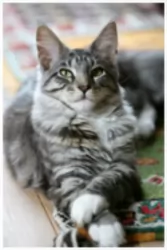 The beauty of American Keuda cats is that they are no-fuss cats and they are energetic, amicable, social, and playful and they make wonderful companions.
The beauty of American Keuda cats is that they are no-fuss cats and they are energetic, amicable, social, and playful and they make wonderful companions.
They are also fond of water and can even strike up a friendship with your dog. By bringing a Keuda into your home you can rely on a steady, loving friendship with your feline friend.
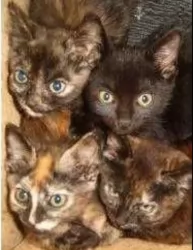 Your cat's health depends on good food. If your finances allow, choose a high-quality food. Check the label for the feeding guidelines.
Your cat's health depends on good food. If your finances allow, choose a high-quality food. Check the label for the feeding guidelines.
Always remember that your cat's age - kittens, adults, and senior cats have different nutritional needs. Sick cats will require a different type of food. Watch your cat's weight because being overweight can bring on a host of illnesses such as diabetes.
A cat has to have access to fresh drinking water every day and night to remain healthy.
Ensuring your feline friend is exercised both mentally and physically is important for good health.
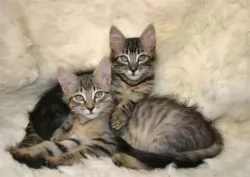 Thes cats enjoy good health and live to be 15 years of age or older even. You just have to watch out for him as they have no undercoats and it’s not a cat to do well in the cold.
Thes cats enjoy good health and live to be 15 years of age or older even. You just have to watch out for him as they have no undercoats and it’s not a cat to do well in the cold.
Whenever you buy a cat for the first time, try and find out about vaccines and previous conditions that might require special treatment.
Healthy kittens and cats are always alert and energetic with shiny coats and clear eyes.
Dental disease is quite common in cats, and it is always a good idea to have your pet’s teeth checked by your vet. Signs of pain with dental problems can include lethargy, pawing at the mouth, facial swelling, and reduced appetite. Get your cat immediately to the vet if you suspect problems with his teeth.
Neutering and spaying are imperative if you don’t want your pet to have kittens. It’s a simple operation for your pet and it comes with many health benefits for your cat. You don’t want your female cat having kittens as there are just already so many stray cats in shelters. Spaying and neutering mellows a cat too, makes them less prone to wandering, spraying, and fighting.
Make sure you have your American Keuda vaccinated against the many cat diseases that there are. Vaccinations are available against feline infectious enteritis or feline parvovirus, cat flu and feline leukemia virus, a disease that damages the cat’s immune system. Kittens require their first vaccine at around 8 weeks of age.
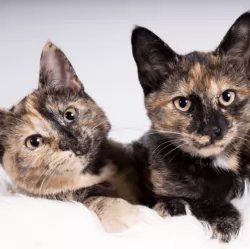 Cats are known to be independent but they still need your care and attention. Before you take a Tortoiseshell into your home, prepare for his arrival.
Cats are known to be independent but they still need your care and attention. Before you take a Tortoiseshell into your home, prepare for his arrival.
Make sure you have food and drinking bowls ready, a comfortable bed, a stylish cat collar and tag of identification, cat accessories such as a brush, toys, and some top-quality cat food.
If you work all day, maybe it would be a good idea to get 2 cats as some cats can get very lonely during the day, and adding a companion can be an excellent solution for his loneliness.
Always be in touch with the vet if you see that your cat isn’t behaving in his usual way.
Your cat will need to be taken for check-ups and also all the necessary cat vaccinations required to ward off deadly cat illnesses.
Provide your cat with a litter box and make sure you remove the cat feces every day.
Provide your cat with toys. Choose them carefully to keep your cat happy and amused. Buy a scratching post too as all cats want to scratch and you want to save your furniture from your cat using it to scratch on.
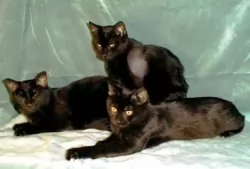 Every cat needs to be fed a complete, balanced high-in-protein food. There are heaps of different brands of cat food on the market - wet and dry. Always follow the manufacturer’s instructions and recommended amounts. If in any doubt about what to feed your cat, speak to your vet. Every cat needs a constant supply of fresh, cool water.
Every cat needs to be fed a complete, balanced high-in-protein food. There are heaps of different brands of cat food on the market - wet and dry. Always follow the manufacturer’s instructions and recommended amounts. If in any doubt about what to feed your cat, speak to your vet. Every cat needs a constant supply of fresh, cool water.
Both young and older cats love to play so ensure you provide your cat with stimulating toys as well as things such as climbing trees and a scratching post. Cats enjoy a high-up place where they can feel safe and view their surroundings from a height.
Cats spend many hours a day sleeping and you need to provide your cat with a warm, dry, comfortable, quiet place to rest. There are many cat beds available, but if you don’t have one, a cardboard box with one side removed and a soft cushion or blanket will do.
Invest in a litter box for your cat to do his business in and keep it in a safe, quiet place where your cat can ‘toilet’ in peace and quiet. These should be placed away from the food and water bowls. Make sure to keep a small plastic rake close by and rake up the cat droppings regularly to ensure the litter tray is nice and clean.
Your American Keuda is a short-haired cat but you want to brush the fur gently at least once a week. Grooming also provides you and your cat with some valuable bonding time.
Provide your cat with a collar to show everyone that he is yours. Also, have your cat microchipped – a tiny chip that carries your pet’s unique ID number and which is inserted safely and gently under the cat's skin.
Have your cat treated and free from parasites such as ticks, fleas, and worms. Speak to your vet about this.